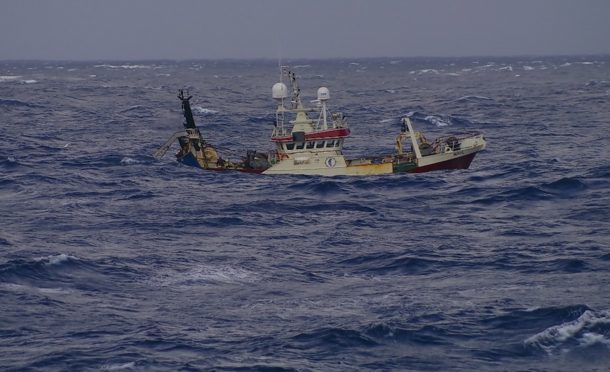A fisherman who died after plunging into the Atlantic spent nearly an hour in the icy waters – because his crew mates had not been trained how to pluck him to safety.
Joshua Aryeetey fell into the sea from the Banff-registered Beryl as he wrestled with a net.
The 47-year-old was left in the water for 50 minutes while his crew mates – who had not been trained to deal with a man overboard situation on the vessel – scrambled to help.
Investigators from the Marine Accident Investigation Branch (MAIB) have today revealed the crew desperately climbed down the side of the boat to rescue him, putting their own lives at risks.
They have now called for man overboard drills to be carried out more frequently to prevent further deaths at sea.
The branch launched a full investigation after the tragedy, which happened on February 10 this year off the coast of Shetland.
Mr Aryeetey, from Ghana, had been standing on a net trying to fix a snag on the shooting doors to the rear of the vessel when he fell at about 9am.
He was eventually plucked from the water and taken to Gilbert Bain Hospital by helicopter, but was pronounced dead at about 11.50am.
A postmortem concluded Mr Aryeetey “died of immersion in sea water as a result of an incident occurring whilst he was working aboard a fishing vessel”.
There was no evidence of him suffering an injury.
And in a report published today, the MAIB declared fishermen must be encouraged to challenge unsafe work practices, and that the accident occurred because Mr Aryeetey had been standing in an unsafe position.
Investigators said that while a “can-do” attitude can be a sign of a good worker, “can-do safely” is more effective than “can-do quickly”.
Crew attempting to help Mr Aryeetey had been untrained with the vessel’s recovery system and experienced difficulty in finding him in the windy conditions.
When all else failed, they took their lives into their own hands and tried to grab him by climbing down the side of the boat. By this time, Mr Aryeetey was unresponsive and drifting away from the crew.
The MAIB report states: “Grapple hooks were then lowered to try and snag the leading deckhand’s clothing or life jacket webbing.
“The skipper and the engineer also took turns to climb down the ladder to try and grab hold of him. Neither was wearing a life jacket or a lifeline.
“In this case, Beryl’s crew had not completed a practical man overboard drill during their time on board and they were unfamiliar with the man overboard recovery system carried.”
The MAIB also found that crewmen had already raised concerns about jammed nets aboard the Beryl – a 91ft whitefish trawler – during a visit with the Scottish Fishermen’s Federation.
It was agreed that the boat’s skipper would ultimately decide what should be done before action was taken on any jams.
All of the crew aboard the Beryl, two UK nationals, one Filipino, one Latvian and two Ghanaians, had completed the mandatory training required to serve on a fishing boat.
The foreign nationals had been employed by the vessel’s owners – JCJM Ltd – for several years.
The firm has since purchased a new man overboard recovery device – a cradle – which it considers to be more appropriate for use with a casualty unable to assist with their own rescue.
Mr Aryeetey had been employed on the Beryl since 2013 and controlled work on the deck.
Described by the MAIB as “well built” and “physically fit”, he was due to leave the vessel in March 2015.
The report comes just weeks after the death of Fraserburgh skipper James Noble was probed aboard the Ocean Way.
The MAIB said ports designed to drain water on the Fraserburgh trawler on November 2 last year had not functioned correctly.
The boat sank and three men, including two Filipino deckhands, died.
